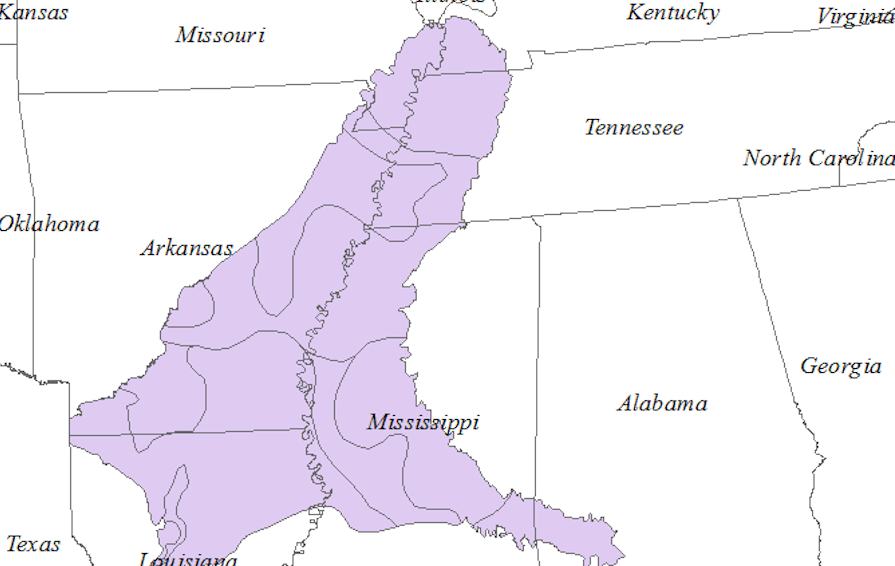US Supreme Court Sets Precedent in States' Groundwater Dispute

The U.S. Supreme Court unanimously denied a 15-year claim by Mississippi that Tennessee has been diverting its water supply from an aquifer that underlies portions of the two states and six others, with justices ruling Nov. 22 that the water should be divided equally, applying for the first time to groundwater the doctrine of "equitable apportionment," similar to the way it is applied to surface waters.
Related to the court case merits, the city of Memphis draws about 120 million gallons of groundwater from the Middle Claiborne Aquifer (see map above) each day from more than 160 wells in and around the city.
Mississippi claimed that the pumping created a “cone of depression” under Memphis and a nearby Mississippi county, caused by reduced water pressure and water naturally flowing to the area of lower pressure, the court said, which "substantially hastened" the flow of groundwater into Tennessee, "allowing Memphis to take billions of gallons ... that otherwise would have remained under Mississippi for thousands of years."
As a result, the court ruling notes, Mississippi said it has had to drill its own wells deeper to access the aquifer, and use more power to pump water to the surface.
The Supreme Court agreed with a lower court decision that an aquifer is comparable to interstate surface waters and therefore the equitable apportionment approach can be used. Mississippi had argued the doctrine did not apply to this dispute.
The high court also denied Mississippi's claim that Tennessee owes it $615 million in damages from the hundreds of billions of gallons of water the state said was once located within its borders underground, rejecting its argument of “sovereign ownership of all groundwater beneath its surface.”
Dispute observers see the case ruling setting a legal foundation as new state water disputes emerge, particularly in areas where resources are declining.
Guidance for Declining Resources
"While expanding the doctrine of equitable apportionment, this decision largely resolves potential additional water rights complexities that could have been introduced if the court had found in favor of Mississippi," says Trey Driscoll, senior principal hydrogeologist at Encenitas, Calif.-based environmental consultant Dudek,
He says Colorado, Idaho, Nebraska, North Carolina, North Dakota, Oregon, South Dakota, and Wyoming filed briefs in support of Tennessee, arguing that if the court ruled for Mississippi, "states would be required to manage shared natural resources for the benefits of other states. Such a ruling would open states to additional lawsuits seeking damages, as Mississippi did, for intrastate use of a shared resource." With its decision, the high court "essentially maintains the status quo in water rights law."
Jill Weinberger, a Dudek principal hydrogeologist, says the ruling is relevant to states such as California, with many of its 515 groundwater basins bordering Oregon, Nevada, and Arizona. "States throughout the West are looking to develop new groundwater resources as climate change limits the availability of surface water resources and population growth requires those resources to stretch further to meet demand," she says.
The Tulelake Subbasin of the Klamath River Valley Basin in California, which borders Oregon, includes that state's input in developing its groundwater sustainability plan required under a 2014 landmark state law, says Weinberger. "Groundwater flow directions are complex across the Oregon-California border in this subbasin, but on average more subsurface flows leave the subbasin than enter it," she notes. "Cooperation in defining cross-boundary flows ... "will limit the potential for interstate squabbles over groundwater rights in this area."
The Supreme Court ruling "points to the importance of developing interstate compacts in potentially contested groundwater aquifers so that each party agrees to extractions that maintain sustainable use of this vital resource for generations to come," Weinberger says.
High Court: No 'Unfettered' Aquifer Control
Robin Craig, a court observer and a law professor at the University of Southern California who specializes in water jurisdiction, said in SCOTUSBlog that during oral arguments, some justices were uncomfortable with the “breadth” of applying the equitable apportionment doctrine to groundwater, envisioning a flood of interstate original-jurisdiction litigation. But ultimately, they agreed.
In writing the high court opinion, Chief Justice John Roberts said "It is certainly true that each state has full jurisdiction over the lands within its borders, including the beds of streams and other waters. But such jurisdiction does not confer unfettered 'ownership or control' of flowing interstate waters themselves.”
In a statement, Tennessee Attorney General Herbert Slatery said the ruling is "a clear victory for Tennessee on all issues, and for all states that share underground water resources."
Mississippi Attorney General Lynn Fitch said the state "respects the decision of the court."
More states that share declining aquifers may now develop interstate water compacts "now that the court has made clear the background principles against which they negotiate," said Craig in SCOTUSBlog. "Combining surface water and groundwater negotiations, moreover, could allow states both to deal with hydrologically connected groundwater directly and to negotiate more creative tradeoffs across resources."
The high court said Mississippi can file a new complaint asking for equitable apportionment of the aquifer, but the state did not make clear in a public statement if it will do so.
But Craig sad it also is unclear if Mississippi will be entitled to equitable apportionment. “The complaining state has a heavy burden of demonstrating that the other state’s water use is causing the complaining state significant injury," she said. "Facts as developed so far indicate that Mississippi will be unable to meet that burden.”





